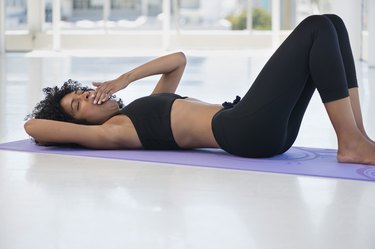
One of the most common reasons people give for not exercising is simply having no energy to work out. Potential causes of this include genuine tiredness, disliking exercise, lack of motivation, doing too much too soon or even an underlying health condition requiring medical attention.
Before starting any new exercise program, make an appointment for a thorough medical examination to rule the latter out as a cause. Once you have the green light from your doctor, it's up to you to find the time and energy for exercise.
Video of the Day
Video of the Day
Get Out and Move!
If you consistently lack the energy to work out, consider that exercise can actually build up your energy levels, increasing your lung capacity and pumping greater amounts of oxygen-filled blood to the brain. Seek out physical activities that you enjoy and want to fit into your life.
Don't be afraid to explore something new. Try a dance, martial arts or yoga class. Sign up for a kayaking or rock-climbing lesson. Forcing yourself to stick to an exercise routine you dislike or dread is usually futile. Finding a fun way to move your body is more likely to leave you feeling energized after exercising and eager for more.
Read more: What Are Some Different Types of Exercise
Combat Your Inner Couch Potato
Sometimes a perceived lack of energy to exercise is really masking an unwillingness to get up and go. If this sounds familiar, try lowering your expectations for yourself regarding exercise.
Perhaps your lack of motivation is just a natural response to being overwhelmed by exercise goals that are too big. Instead of forcing yourself to walk for an hour, start by stretching or skipping rope for five minutes during television commercials, three times a night.
Not only does this help keep you coming back for more, but it also decreases any extreme sleepiness during exercise. Gradually increase the number of times you exercise and the amount of time you spend. If you're an organized type of person, try scheduling your exercise like you would any important appointment.
Tap Into Your Willpower
Having the right motivation to exercise can make you feel as if you have enough energy to exercise. Aging and health concerns spur many people to exercise, but you don't want to wait for these to occur to get started.
Motivation will likely increase if you have the attitude that being fitter and healthier will help you achieve particular personal goals, such as fitting into clothes you wore five years ago or running a marathon. You might also find the energy for exercise if you participate in activities you enjoy.
Boost Your Body Chemistry
Scientists know all about the link between exercise and the production of hormones called endorphins; these have the familiar nickname of the "feel-good" hormones because of their mood-elevating properties.
Endorphins help reduce stress, improve focus and concentration, and help relieve pain by providing an analgesic effect. If you believe that feeling good gives you energy for exercise and that lifting your spirits lifts your energy level, then this is another way that exercise itself can increase the desire to work out.
Consider a Dietary Makeover
Certain physiological factors affecting people's energy levels make them tired after workout sessions. Things such as metabolism and genetic traits are difficult or impossible to change. You can, however, alter your diet to give you more energy for exercise.
Carbohydrates are energy-producing foods. While refined sugars only produce quick energy, eating foods rich in carbohydrates both before and after exercise can help promote energy levels. Whole-grain cereals, pastas, breads and crackers provide healthy sources of carbohydrates for sustained energy, as do most fruits and vegetables.
- USDA ChooseMyPlate.gov: Physical Activity
- Association for Applied Sport Psychology: Exercise Adherence Tips
- Centers for Disease Control and Prevention: Make Your Workout Work for You
- American Council on Exercise: Your Brain on Exercise: The Neuroscience Behind a Good Workout
- Cleveland Clinic: The Best Ways to Fuel Your Workouts Might Surprise You
- Mayo Clinic: Eating and Exercise
- Diabetes Self-Management: No Energy For Exercise?
- Clevand Clinic: Exercise Basics
- The University of New Mexico: Exercise Motivation
- NHS Choices: Overcoming the Barriers to Exercise